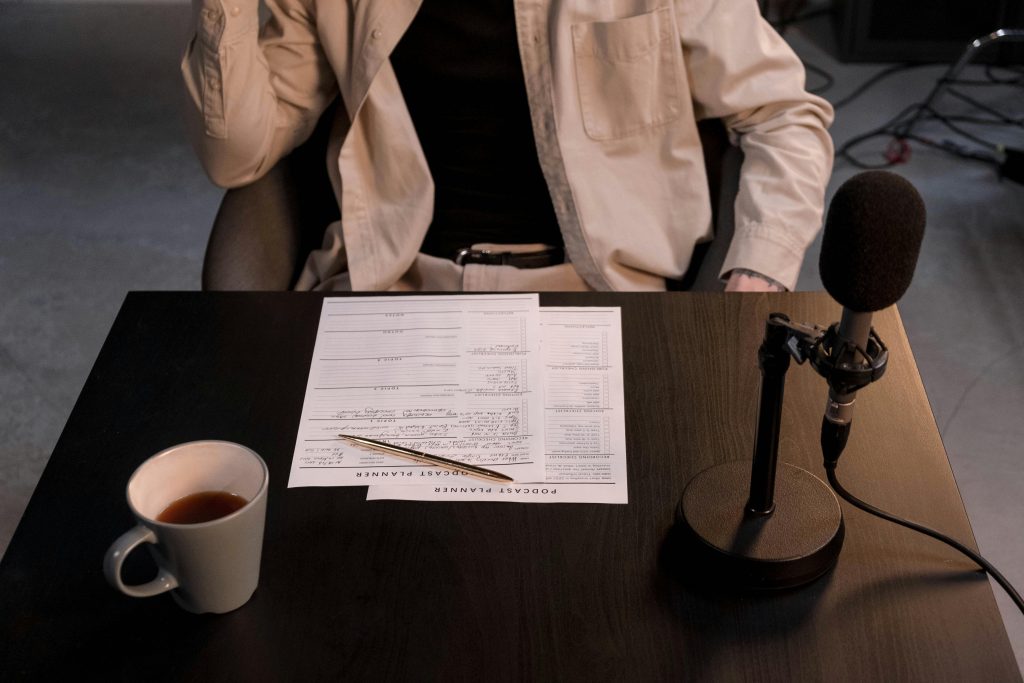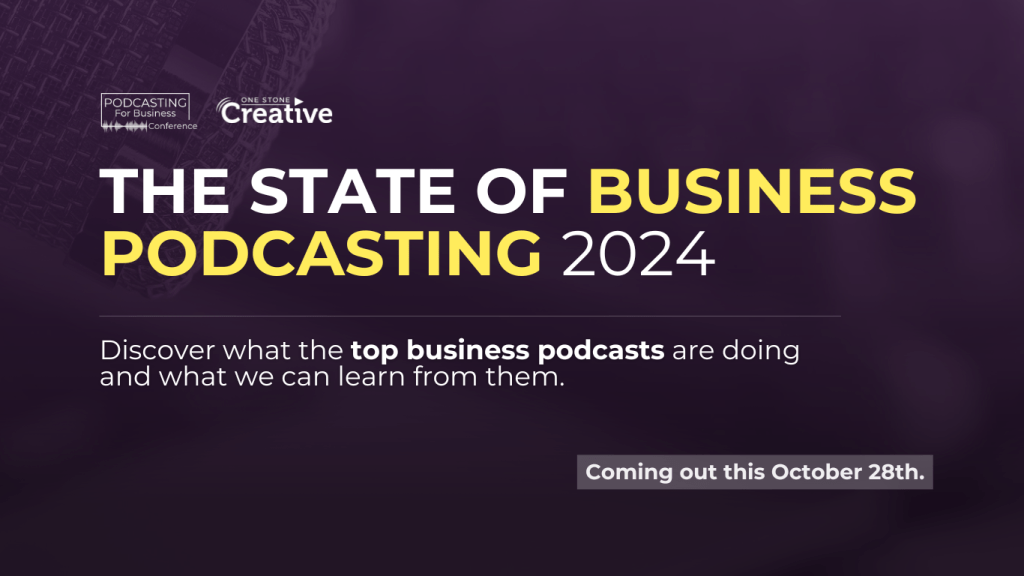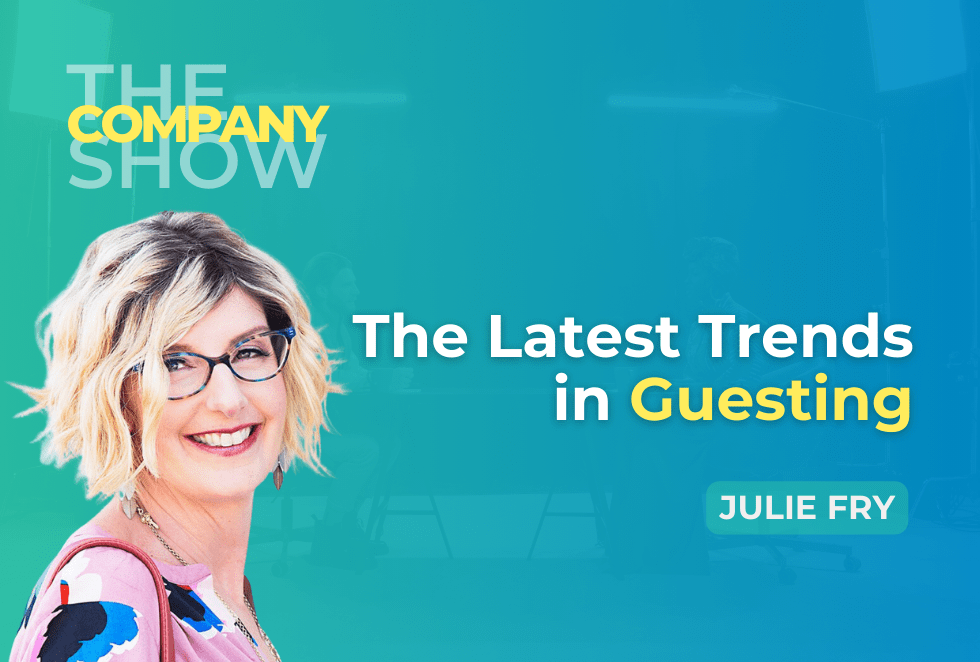Let’s talk about guest appearance pitches.
You’ve received them and hopefully you’ve also sent them. There’s a lot that goes into a guesting strategy research, crafting the pitch, being on the show itself, and encouraging the listeners of that show to connect with you.
All of these things are changing all of the time.
There are trends in guesting the same way there are trends in all other types of marketing. You need the best information to craft the best strategy for your business.
My guest today is an expert in guest pitching — Julie Fry is the founder of Your Expert Guest, a podcast booking agency for women making an impact who want to be heard by their ideal clients without spending hours on social media, which is something I absolutely understand.
Julie has tons of great information for us, and I was especially fascinated to hear what is the most effective strategy in converting listeners to real connections these days. It is not the same as it used to be.
Listen to the episode below or continue reading the blog post!
Tune in to the full episode to learn about:
- How to Find the Right Shows to Guest On
- Podcast Searching Tools
- How to Go Through The Podcast Outreach Process
- Should You Send Your Interview Questions in Advance?
- Simplifying Calls to Action
- The Post-Guesting Experience
- Tracking Your Guesting Campaign
- Repurposing The Shows You Guested On
The Podcasting for Business Conference is happening this November — learn more about it here!
How to Find the Right Shows to Guest On

Julie: “I’m the founder of Your Expert Guest. We’re a podcast guest booking agency for women business owners, thought leaders and authors. That is what I do professionally. Personally, I am a wife, a mom to two teenagers, and now a mom to a tripod dog. He just lost his leg recently and he’s joining me here with this in this podcast recording.”
Megan: “Let’s talk a little bit about podcast guesting.
I know a lot of the people that you work with are going to be listening to this episode. Many of us who have podcasts or who work at the podcasting industry, we know we should be guesting and we know we should be doing it a lot more than we probably are.
It’s one of those things that’s a little bit easy to get backburnered, and one of the sticking points that often comes up for people is how do you actually find the right shows to guest on podcasts.
Search is not functional in too many platforms. So what are your recommendations for finding the shows that are going to be a good fit for you?”
Julie: “Number one is have a timer.
As you know, if you have done this yourself, it is so easy to go down the rabbit hole of, oh, this looks like a really interesting show for me. And then you scroll down to the bottom and you look at other shows that listeners subscribe to and then two hours later you just found yourself in the halls, in the, the cobwebs of Apple podcasts, trying to find all of these shows.
So rule number one, set a timer for I say, 15 to 30 minutes so that you are setting an end time. In that time, it is very likely that you can find some great shows for you to be a guest on.
When we are onboarding new clients and helping to identify what are going to be the best shows that will generate some return on investment for you because you can go on any show and talk about — I mean, I love cold plunging. I could go talk about cold plunging on lots of shows, but that’s not necessarily going to drive business for me.
So one of the things that we would suggest that if you’re curious about guesting and looking at shows is looking at who your clients already are and what industries are they in. Just an example, we have a client who owns an executive virtual assistant agency, and so she loves working with financial advisors, professional service firms, creative agencies.
So when we were pulling together her initial list of podcasts, we are looking for shows in those specific verticals because the more specific you can get within a industry — like a show for architecture firms.
If it’s a show about the business of running an architecture firm, they’re going to be bringing on sales professionals, operations experts, bookkeepers, CPAs, and the list goes on and on. And so when you go on a show like that, you’re coming in as the expert in your field of delegating and expert assistance.
You’re not going on a show that is about being a virtual assistant or an executive assistant, where you’re just hearing stories of people being executive assistants. You will not stand out in a crowded pool like that. So you want to go into a show where you’re going to stand out as the expert in your area.”
Megan: “I like that. It’s a really important distinction too, because I think the first instinct that you might have when you go, I need to be on podcasts. I’m a podcast producer, so I better find podcasts about podcasting.
It feels, intuitively, that’s the way to go, but you’re making a really good point.
It’s the people who are our clients of podcast production, what are they listening to that’s going to be a better fit to actually drive the business. I love that.”
Podcast Searching Tools
Julie: “That’s tip number one — look at your verticals or if you’re looking to expand into a different type of client, that would be another clue is just to look for shows that are speaking to that particular client.
As far as how to find the shows like the actual tactics — good old Google, that is a great one, especially as they’re infusing more AI into their search results. What are great podcasts about the business of podcasting? And it’ll pull up shows.
You still have to go through the legwork of clicking through the shows. Are they still active? Do they take guests? Is the host aligned values wise and energy wise with me? So you still have to go through the legwork of that. But good old fashioned Google.
We like Listen Notes too. We do pay for some software. There are a number of podcast databases out there that are for PR agencies, marketing agencies that you can pay a subscription fee for to use.
So there are plenty of those as well, but between Google and Listen Notes and the podcast platforms, you can usually do a really good job of finding shows.
How to Go Through The Podcast Outreach Process

Megan: “Let’s say we have found them. We found maybe a shortlist. We’ve got five or 10 that we’d like to apply for. Everyone who has had a podcast for more than 35 seconds has gotten a terrible podcast pitch.
No one listening to this will send a terrible podcast pitch. But as the expert who crafts these on behalf of people, what are a couple pointers people should keep in mind when they are preparing their outreach?”
Julie: “I always encourage people to flip the script and it’s not as much about you. And this is actually a really good point for the people that are hesitant to pitch themselves or get hung up on, I’m not expert enough. Why would anybody wanna have me on a show?
Is it’s really not about you. It is about the podcaster and their audience. And so when you found a show that you feel is a great fit and you scrolled through their previous episodes, you found that they haven’t covered what you want to talk about recently — you’re doing them a service by suggesting:
Hey, I’m Julie Fry and I want to talk to you about the power of guesting on your show. I noticed that you haven’t covered it in six months or so, and I can provide a slightly different perspective on it than your previous guest did.
So podcaster opens up the pitch, you’ve personalized it, you might have a skeleton pitch template, but you’ve personalized it to the host. You’ve suggested an interview topic. You’ve given a few talking points that you might discuss in the episode. You tell them how you’re going to share the episode when it goes live. You’ve just made their job a lot easier.
I come from a background in business development and so it was drilled into my head to make it easy for people to do business with you. And so this is just another example of that — make it easy for the podcaster. They’re already busy enough, they’re running a business, they’re doing a podcast, they’re managing their team.
Don’t add more work for them to have to filter through your pitch and figure out what do you even want to talk about? Why do you want to be on my show? What are you going to talk about? Just tell them, suggest it. Don’t tell them in a bossy way, but suggest it kindly.”
Megan: “I love that. I want to particularly highlight that acknowledging of where you would fit in their body of work.
I get so many pitches all the time that are completely irrelevant to what we do. And even when it is something who’s sort of relevant, no one has ever pitched me and said, actually, you haven’t talked about this in six months. Here’s a new angle. And I think that’s a really fascinating, nice way to differentiate shows you’re really actually paying attention.”
Understanding Podcast Formats to Avoid Pitching Mistakes
Julie: “I have a podcast that is six episodes and it’s primarily for client onboarding, so it’s about guesting. I got pitched by a travel agent who wanted to come on my show and talk about the value of working with a travel agent. I was like, are you kidding me?”
Megan: “The ones that annoy me the most, I think are the ones like, this entrepreneur has an amazing journey and an amazing story to share. I respect that people have journeys. I respect that a lot of podcasts talk about them. I have never done so on my show, and I never will because it’s a practical tactic space show.”
Julie: “So that’s the other piece too, is just before you’re reaching out, listen for those differentiations.
You can often go and look at the episode history and see how are the episodes framed? Are they more tactical or are they more a personal journey? Because there definitely are personal journey shows, and depending on who you are and what you’re trying to accomplish, that’s a great type of show to go on.
But know your audience and know what they’re looking for, because hosts are getting pitched all the time and you don’t want to end up in the delete or worse, forward to an agency like ours like, ugh, can you believe this pitch?”
Megan: “I’ve got a couple friends on shortlist who like to receive that kind of pitch. So we’ve got them on auto send and there’s some great newsletter content that gets developed out of it.”
Should You Send Your Interview Questions in Advance?

Megan: “As we were getting settled today in the pre-show, basically we were chatting a little bit about the list of questions that I had sent you as potential things that we might want to talk about.
And you made the interesting point that you don’t get those for your clients very often from the shows that you’re pitching them on. Share your opinion on that a little bit. What do you think about questions being sent in advance?
Is it better to go off the cuff? Does it depend and on what?”
Julie: “That is part of the process that we put together for our clients. We have a list of sample questions.
So sometimes a host will say, can you give me a list of questions that your client might want to be asked? So we have those at the ready. Really what it comes down to is when you are guesting on shows intentionally, whether it’s to build awareness of your own podcast or build awareness of your own brand or your company, you have a goal of what you want the listener to do when they hear this episode.
And so we really suggest having the stories and the key points that you want to make in an episode so that if you get questions from the podcaster beforehand, how can that align with what your end goal is for the podcast? And if you don’t get those questions, well then you get to not necessarily drive the bus because it’s a conversation.
It’s going to take detours and go around the roundabout, but at the end of the day, you still have points that you want to make and stories that you want to share. So I’m fine with them. I think they’re great, but they’re not a necessity because really if you’re intentionally guesting on podcasts, you have your core stories that you want to share.
So I think that sometimes that can be a little bit of a crutch if people rely on those questions too much because then they’re getting interviewed and not necessarily sharing the things that they came to to share, if that makes sense.”
Megan: “Do you think that ever puts the host and the guest in a little bit of conflict? If the host has their objective and the guest has theirs?”
Julie: “I think it can. That’s why we always suggest with our clients that this is an exercise in flexibility.
Sometimes we will pitch a client for a particular topic and the host is like, I don’t really wanna talk about that. I wanna talk about this — and it might be kind of a spicy topic. And most of our clients are not in the political space, they’re more business-minded.
And so if it allows them to share their unique point of view, especially if it’s a oppositional view to the majority of the industry, then that’s a great opportunity as long as that aligns with how you want your brand and your business to be known.
So I think it can, and then it’s always at your discretion to decide, okay, well, is this the right opportunity for me or not? But at the end of the day, these are conversations, they’re opportunities to build your professional network, to grow awareness of your brand, to exercise that muscle in sharing your messaging.
You learn a lot through the whole process. So we just suggest really trying to be open and flexible.”
When Podcast Pitches Go Sideways
Megan: “I didn’t prepare you for this one but I’m desperately curious, do you have a story of an example of either a sent in advance or live on the call of a oh hell no questions or topics that a client experienced or that you experienced?”
Julie: “That’s a really good one. I have not personally experienced that. I feel like it doesn’t get to that point.
There are a fair number of hosts that want to do pre-calls before they have the actual interview, and I’m sure you’ve seen this too, where guest and hosts don’t know each other. They come together for a 10 or 15 minute chat to dig into a topic that they’re going to discuss a little bit more and what they both want the takeaways to be for the audience.
So we have heard about this coming up with a particular client where the host was using the podcast as a funnel for their own business. Then in the conversation that the client had with them, they were very savvy because it wasn’t completely clear, but they could tell by the questions that he was asking that really, this was a sales coaching opportunity for the host.
So they decided, thanks, but no thanks. I don’t want to move forward with the interview. But that’s the closest that I have experienced with an interview totally going sideways. We do try to work with podcasters that we’ve worked with before, whenever we can. Not to say it won’t happen in the future, but I don’t have a firm off the rails conversation example.”
The Subtle Art of Pitching
Megan: “Let me give you a little bit of a praise within the industry for it, because you’re definitely one of the people — when I get a potential guest introduction from you, I’m going to at least really pay attention because I know you’ve paid attention to our show and to our business. And so I like getting those messages.”
Julie: “That’s always a nice feedback to get.”
Megan: “I mean, using a podcast as part of a funnel, it can be a really legitimate strategy, but man, if your guests can notice right off the bat what’s going on, that’s not necessarily a well executed strategy.”
Julie: “Or if they’re getting cold pitched, DM’d on LinkedIn to come on my show, and then, oh, by the way, it’s $495 — have your Spidey senses up for opportunities like that.
As you mentioned, anybody who has a show for 35 seconds is already getting pitched. So in general, you need to approach the host to come on the show.”
Simplifying Calls to Action

Megan: “We talked a little bit now about how you do have, not necessarily an agenda, but a message that you want to share and an action that you would like listeners of the podcast to take.
Do you have some strategies for how to make it more likely that someone listening is going to actually follow the link or connect with you on social? Because we want it to happen. We ask for it to happen, and it happens a lot less than we all hope it will in most cases. So what’ your expert advice for us?
Julie: “Well, I think there’s some things happening. I think the reality is that people have email fatigue. So the old days of 2015, 2016, if you went on a podcast and you had a free ebook — if I had a free ebook on pitching podcasts, that I would’ve gotten a lot of downloads for that back in those days.
Fast forward 10 years later, we all have overflowing email boxes. We can’t even get through the emails that we want to get through. People are just a lot more closely guarded with giving away their email. So we suggest for most of our clients, again, knowing that they’re business owners, looking for business visibility to really decide is it more important for you to get social followers?
Is it more important that people listening book a call with you to learn more about working with you? Those are really the two that we toggle in between. Of course, most shows are going to have show notes. They’ll have links to your social media profiles, to your website. If you have a free resource, it’s there.
But we are finding that most of our clients are seeing more success with seeding, working with them as a business and then at the end of the call, if you have a complimentary consultation — issuing that invite and picking one.
So don’t run through the list of, here’s my Instagram, here’s my LinkedIn, here’s our website, here’s our free resource. Because then a confused mind doesn’t make any choices. Just giving one choice, you increase the likelihood that the listener will act on that choice.
But in the show notes, there are lower impact ways for people to check you out, so to speak. So it’s kind of nice to have. The low, the medium, and the high investment of the listener to connect with you.”
Megan: “I love it. I’m officially positioning you to track and publish that data because that is solid gold.”
Julie: “Yeah, it is really good. And since we kind of stopped worrying about the, oh, you have to have a call to action that gets people on your email list — it just takes a lot of the stress off the guest as well.
Because if you don’t already have one, what do you do? And you know, I’ve seen people put hours and days and weeks into something like that and then it just flops. So we kind of just go to the what do you really want people to do and let’s focus on that particular outcome.”
Megan: “Oh, I love it. So connecting with and getting a next step from the broader listening audience is one important goal.”
The Post-Guesting Experience
Megan: “There are also a lot of guesting strategies involved in networking with the hosts and using that as part of your relationship building. The Company Show, it’s no secret — part of it is a networking show.
It’s a great way to get to spend some time with people and get to know them a little bit outside of maybe a prep call, which you talked about are more common. Are there any other follow up steps or nurturing steps you can take to improve the relationship that as a guest you have with the new host?”
Julie: “Obviously this is something that we really encourage our clients to do is stay in touch with a host, especially if they could be a referral partner for you, or if you just really vibed and enjoyed the connection and want to be more in that host sphere of influence.
So I suggest keeping a spreadsheet. We use Airtable and as I go on shows where I’ve really connected with the host and/or we might be great referral partners together, I drop them in that spreadsheet and then I make a plan to stay in touch.
What I do after a show is step one, once we stop recording, I’ll chit chat with the host a little bit, find out what’s going on in their business, is there anything new that’s going on? A podcasting conference or a new book that they might have, and is there anything that I can do to help support them in that way?
Trying to be authentic and also aware of these things because you’ve done your research about the host. Then I will send a thank you to them via mail. I do a rating and review for their show, so I do those acts of generosity that show I actually do really care about them, and then if they’ve made it onto that referral partner spreadsheet, then I just make an intention to follow up with them on a regular basis.
I would say at least once a year at a minimum. You know, in reality I would love to do it quarterly. The reality is it’s probably more like every six months, just because we all get super busy.”
Megan: “That’s a much less overwhelming amount of follow up. I’ve seen recommendations right now, every month, every other month and it’s just, yeah, I don’t want to hear from my friends that often.”
Julie: “I know, right? I mean, there are people that I love in my life — my sister that I don’t talk to that much. So yeah, I feel like six months is great. I mean, I have podcasters that I’ve gone on their show and we have done joint webinars together. We’ve referred each other business. We’ve become friends.
Honestly, the reason I started this business is because of a podcast appearance I did in 2014 that we just became friends and business colleagues, and I saw the impact that it could have on your own business, and that was why I started this business.
You never know what these new relationships can do for you.”
Megan: “Oh, it’s so true. The Podcasting for Business Conference, which you so kindly alluded to, first year that we did it, it was composed almost, I think about 90% of guests that I’d had on the podcast that became people I knew well enough to be able to say, Hey, I’m doing this new thing. Would you help? And most of them were just like, absolutely.
That’s really marvelous because of that foundation from the podcast.”
Tracking Your Guesting Campaign

Megan: “The hosts have already got their stuff tracked, but if I was going to start a new guesting campaign right now, what would you recommend I track in my new shiny spreadsheet?”
Julie: “I’m gonna have to think about what’s in our spreadsheets. It’s a lot, it doesn’t need to be as robust as ours are.
The name of the show, link to the podcast. You can easily pull in a description of the podcast, that’s always nice to do. Did you pitch them the dates that you pitched them and followed up your interview date? Their social media links? You can go that deep.
Did you have a free resource or some call to action from the show and then measuring any ROI from the show? Did you book a speaking engagement? Did you get new clients? Number of discovery calls, number of new followers.
I would say that’s the most important piece is measuring what that show is doing for you. And dollar amounts are great to put on there if you are finding that you’re getting clients. Because then if you’re doing a really intentional guesting campaign, you can go back and see:
Wow, all the professional services shows that I guested on they generated a chunk of business for me. The personal journey shows that I did, not so much. So I’m gonna focus on these professional service shows.
So that would be the end goal. Think about why you want to keep this spreadsheet. Number one is to help keep you organized with your follow-up. A good example that I will share is when I came on to Megan‘s show, she has a great onboarding form that collects all of the information. So I didn’t necessarily need to send her all of my information.
Again, on my spreadsheet, I have a little checkbox that shows, did I send the information to the host? I had not checked that yet, so I had to ask her, do you need to have my bio or web or social links? And she’s like, nope, you already gave it to me. So I had face palm moment that I didn’t check the box.
That’s a helpful thing to have in your spreadsheet, so you know if you need to do that or not. Most hosts are really organized and they have it in an onboarding form, but some don’t. And so you would need to send that to them, especially if they don’t request it, which sometimes they don’t.”
Megan: “There’s a massive amount of diversity in the ways I can decide to collect or not collect information. I always feel a little tremor of, oh, is this going to work out? When it’s like, oh, my people will reach out.
Sometimes that goes really well and sometimes that does not go really well.”
Julie: “I just don’t understand in this day and age why you would not have a scheduling link.”
Megan: “Oh, yeah. One of the best things we ever did to smooth out guest booking was just pop it all in the form to book the date.
They’ve got to give the bio and the headshot because otherwise it’s so much scrambling right before release. Everyone’s happier this way.”
Repurposing The Shows You Guested On
Megan: “So we’re running down to the end of our time. Julie, you’ve been so generous with your knowledge, but the last question that I’ve got for you.
It’s about repurposing and especially repurposing the content of other people’s shows that you appear on. Are there any rules, is there particular etiquette, or do you have any particularly good strategies for using this content?”
Julie: “I’m sure you talk about this with your clients too, but that’s another benefit of podcast guesting, is that you don’t have to go out and create all this new content.
You’re generating it through your podcast interviews. Tip number one is if you know that you’re going to be repurposing when you have the interview, just ask the podcaster if they would be willing to share the video footage with you.
I don’t deal with the technical side of this, we have another team member that does, I might not be using the right terminology, but just asking permission and then letting them know that you plan to create more content from the interview.
Most hosts are like, heck yeah, and are happy to share that with you. So examples of what you can do if you’re using LinkedIn or Instagram, you can create Instagram reels, you can do video shorts that you can put on LinkedIn. They can have the captions in there so that people scrolling don’t need to have the audio on. They can just read what you’re talking about.
Carousel posts, social media posts, blog posts, audiograms, the list goes on and on. I’m a big fan of repurposing so that you’re taking care of the content once and then creating say, 10 pieces of content from your interview.
In terms of tools, you probably also are familiar with some of these, but some of the ones that we use are Descript and Opus is a new one. Are you familiar with Opus?”
Megan: “Yeah, we’ve been testing that a little bit. It makes okay choices. Because we do the editing, right? We can just pull out clips during that process and that s handy to be able to do.”
Julie: “But then if you are not the editor and you’re using other people’s footage, finding the tools out there, so those are just a couple. There are tons that you can feed your data into and it will create the clips for you and pretty cost effectively.”
Connect with Julie Fry
Julie: “We are a yourexpertguest.com and we love working with women business owners, thought leaders and authors.
If any of this has piqued your curiosity, I have a free chat and it’s no obligation. We just talk a little bit about what your goals are, who you want to reach, and then we talk about whether we can help you or not.”
Final Thoughts
Get out there and get guesting. I’m gonna be taking some of this advice to heart.
Being a guest has always taken a back burner to hosting this show for me, but it really is one of the most solid ways to connect with new audience and bring them into your own podcast or to your business more generally.
Make sure you check out Julie at yourexpertguest.com.
The State of Business Podcasting Report 2024

Next week is a really exciting week at One Stone Creative. We’re going to be releasing the fifth annual State of Business Podcasting Report, and I can tell you now there have been some interesting changes in the trends and best practices for company podcasts this year.
I cannot wait to share them with you!
Get all of the details and sign up here to receive it as soon as it drops, Monday the 28th.
Next week, I’m going to be sharing some selected results here on the show, so make sure you’re subscribed to The Company Show on your favorite podcast platform.
Podcasting for Business – The Book
In case you haven’t gotten it yet, my book Podcasting for Business: How to Create a Show That Makes a Bottom Line Difference for Your Company, is available now!
If you think your podcast should be a little bit more profitable (or a lot more profitable), I highly recommend that you check it out.
There’s going to be some great information there for you.
Podcasting for Business Conference 2024
We’ve got over a dozen expert presentations, expert Q&A, panel discussions, workshops, and lots and lots of networking opportunities.
It’s happening from November 13th to 15th this year. Learn more about PFBCon here.
Be A Guest on The Company Show
Do you have a podcast that’s making a major difference in your business or know one that is? Fill out this contact form and let us know about it.
We’d love to have you here for an episode like this one!
Need A Podcast?
As always, this is Megan Dougherty, and The Company Show was made possible by the team at One Stone Creative.
If you know a business owner that you think should have a podcast, do us a favor and send them to podcastingforbusiness.com!
Key Quotes
“A confused mind doesn’t make any choices. Just giving one choice, you increase the likelihood that the listener will act on that choice.” – Julie Fry
Resources
One Stone Creative | LinkedIn | Twitter | Facebook | Instagram
- Order the book, Podcasting for Business
Learn about what other business podcasters are doing:
Julie Fry | Website | LinkedIn | Facebook | Instagram

